|
OCEANS
DAY 11 NOVEMBER 2017,
COP23
ABOUT -
CONTACTS - FOUNDATION -
HOME - A-Z INDEX
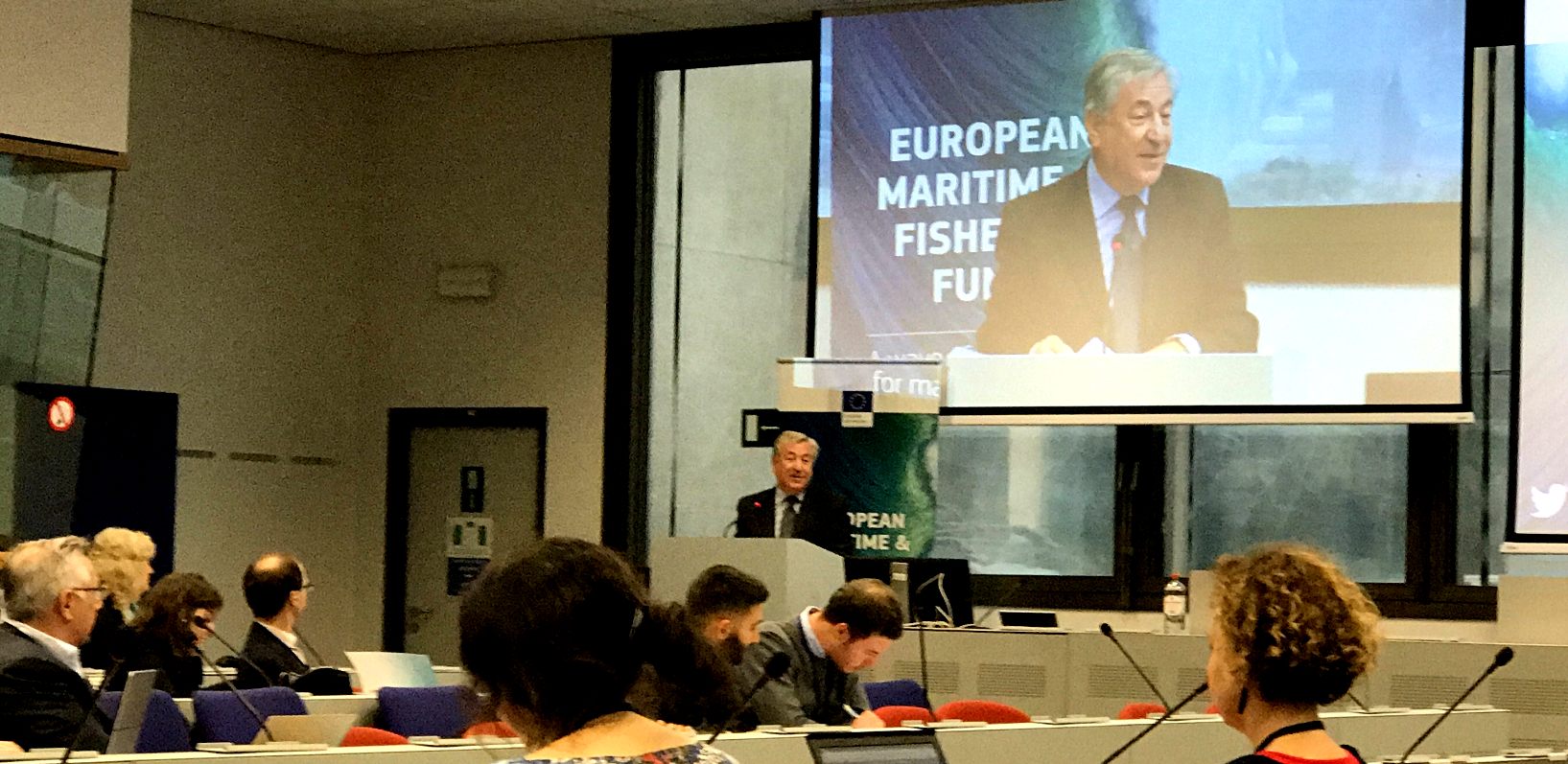
KEYNOTE ADDRESS:
Karmenu
Vella is seen above giving the keynote
address at the EMFF information day on the 9th of November
2017 in Brussels. At the Oceans Action Day event in Bonn, Mr Vella
gave the following speech:
"Minister, Colleagues, Ladies and gentlemen,
Thank you for joining us here today for the European Union's COP 23 Oceans Day.
Much has been said today about "our oceans, our climate".
And the evidence is clear: our oceans and their capacity to ensure our very existence are under threat.
Climate change is making oceans warmer, more acidic, and less rich in oxygen. And it is not only climate change that is putting our oceans at risk. So are pressures from overfishing, pollution, high-impact tourism, shipping and the list goes on.
These pressures accumulate. They interact with one another. For example, science tells us that organisms might withstand a certain amount of acidification. But faced with the extra stresses of plastic pollution and global warming, they risk losing this ability to adapt.
That is why putting the ocean's health front and centre of our climate, environment, and economic policies has never been more important.
And it is true that oceans are receiving more political attention than ever before.
The link between oceans and climate is also increasingly being recognised and I full-heartedly thank the Fiji Presidency for having declared oceans as a priority of this COP.
Thank you also for the Oceans Pathway. The path it shows can help us strengthen our global efforts in the medium and long term.
But I am also thinking about the UN Ocean conference in New York. Or the record-breaking Our Ocean conference that the European Union hosted in Malta last month, which saw more than 7 billion euros worth of pledges from governments, business leaders, and civil society.
But pledges are just the start. The real test of our success will be the impact we have and the change we create.
And, when it comes to climate and the oceans, let me highlight three areas of action:
action to reduce CO2 emissions;
action to restore marine and especially coastal ecosystems; and
action to improve international cooperation.
First, reducing CO2 emissions. And for the European Union like for all but two countries in the world that means Paris.
As my colleague and good friend Miguel Arias Caρete said earlier this year: "We will stand by Paris, we will defend Paris, and we will implement Paris."
And we will support Paris not only by cutting emissions, but also by investing in climate and ocean research.
For all the progress that scientists have made, we still do not know nearly enough.
So the European Commission is committed to investing more than a third of our 80 billion euro strong Horizon2020 research programme to reduce these knowledge gaps.
For example research into the changing cryosphere, which will increase our understanding of the large ice sheets of Antarctica and Greenland.
And let me quickly mention two areas that may deserve more attention in the context of cutting greenhouse gas emissions.
One is shipping a major source of CO2 emissions, and a sector with no global emission reduction objective. I therefore very much welcome the recent IMO decision to agree on an initial emission reduction strategy next year and a comprehensive one by 2023.
The other point concerns ocean energy. Energy from the ocean is clean, and it is plentiful. It could be extracted from streams, tides, waves, thermal and salinity gradients, and provide clean-energy solutions for remote areas, offshore installations and islands.
According to our estimates, ocean energy could meet up to 10% of the European Union's power demand by 2050. This is not just good news for our climate. It's also great news for our economy.
We are speaking about a global market of up to 53 billion euros a year. In Europe alone, jobs in ocean energy are expected to double within the next decade.
So the European Union will continue to prioritise ocean energy as part of our push for a sustainable blue economy. Because developing ocean energy matches so well with our core priorities, in terms of jobs, investment, energy and climate.
Second, beyond the Paris Agreement, we need to work to keep marine and coastal ecosystems healthy.
Oceans are the world's largest carbon sink. Coastal habitats account for about half of the carbon sequestered in ocean sediments. Mangroves, tidal marshes and seagrasses store carbon for centuries. When they suffer, so does our
climate.
Protecting and restoring such ecosystems is a priority.
And just yesterday in Brussels, I announced that the European Union is making available 14.5 million euros for a sustainable blue economy. Part of this will be used to restore degraded coastal and marine ecosystems in the Mediterranean.
But protecting marine ecosystems also means putting an end to illegal fishing around the world, or making sure our own fisheries and aquaculture are sustainable even as our reliance on the oceans for food continues to grow.
And it means tackling the up to 13 million tonnes of litter that end up in our oceans every year. The majority of this comes from land sources: rivers, sewage, landfills. And much of it is plastic.
That is why the European Commission will be launching a Plastics Strategy before the end of the year. To curb littering and single-use plastics, and to increase recycling. The 14.5 million euros I announced yesterday will also contribute to tackling marine litter."
"Ladies and gentlemen,
My final point is the importance of working together for better managed oceans.
Last year, the European Union adopted an agenda for the future of our oceans. And we continue to push for better international ocean governance.
Because like climate change, ocean ecosystems do not know or care about national borders.
So we continue to step up our work with international partners.
Like our recently launched Pacific-European Union Marine Partnership. It supports the sustainable management of natural resources, climate resilience and marine biodiversity in 15 African, Caribbean and Pacific states.
I am convinced that we need to better connect ocean advocates, from the public and the private sector alike as we did with the Our Ocean conference.
Just think of how much more powerful our action will be if we combine forces! With our combined weight, we can accelerate the low-carbon transition and meet the goals of Paris and of the 2030 Agenda for Sustainable Development. In this context, the role of oceans in the Global Climate Action Agenda cannot be big enough.
And as we forge ahead, let's not forget our many existing achievements that we can continue to build on.
Starting from Paris with the preparations for the Strategic Action Roadmap on Climate and Oceans, and continuing with the first Ocean Action Day in Marrakesh and of course the second one tomorrow.
This process is a great example of ensuring synergies that make us advance in the same direction.
And that is also what we have tried to do today: advancing our common cause by coming together, exchanging views, and paving the ground for stronger cooperation and coordination after Bonn.
On behalf of the European Union and on behalf of our oceans and our climate: thank you all for being part of this endeavour."
EMFF
INFORMATION DAY 9 NOV 2017
Proposals
are being invited to tackle marine litter by the European
Maritime & Fisheries Fund. The pictures below tell part
of that story that is sure to unfold over the next few years
with successes and failures. We hope many more successes to
report on.
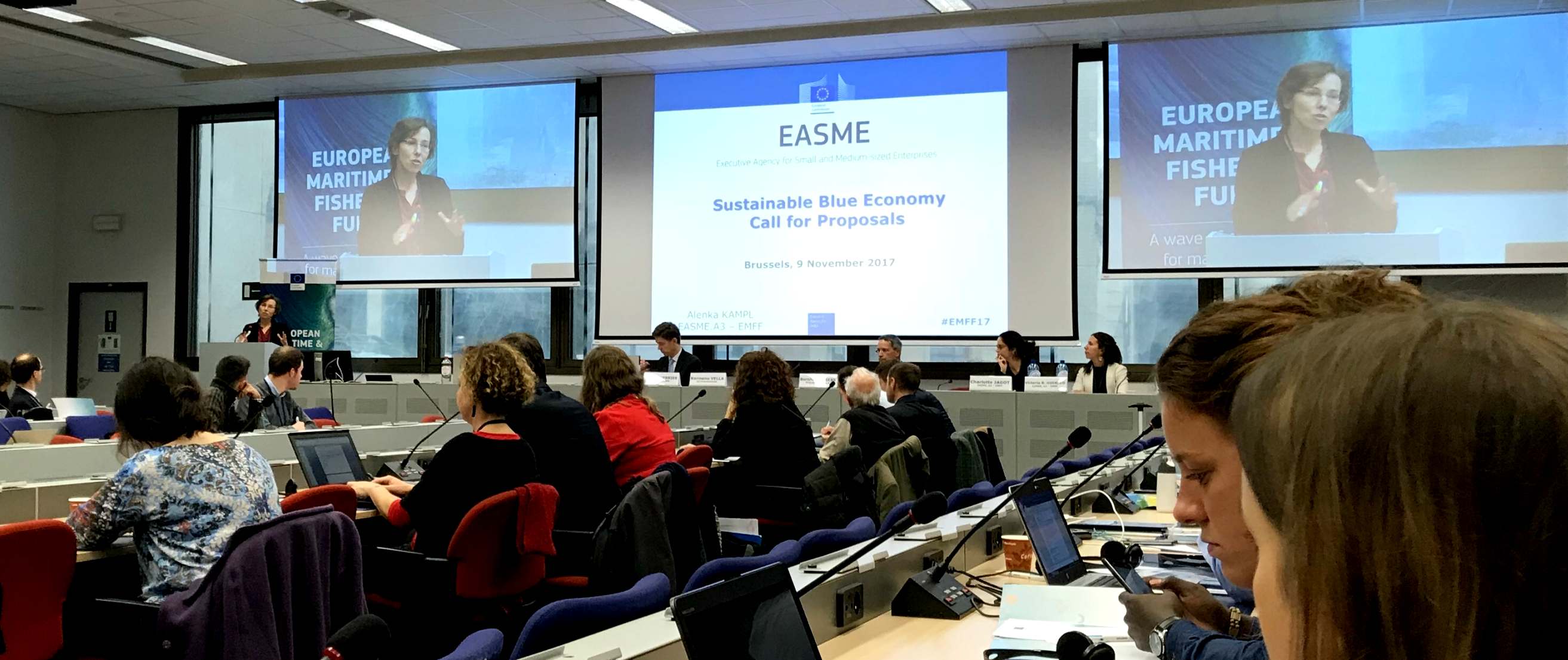
STRAND
1: Alenka Kampl came across very clearly and methodically
as she explained how the EMFF were seeking to reduce the
funding gap to scale up business models from blue sky concepts to fully functional
commercial systems that would benefit the
blue economy. She confirmed that there is 8 million euros set aside to fund eight
projects of 1 million euros each. The activities would include
validating new systems and working with stakeholders to
prepare for commercialization. The funding rate would be 65%
for demonstrations. Under Strand 2, the funding rate for
marine litter projects would be 80% and should last for
between 2 and 3 years. COF consider this to be a step in the
right direction. Insufficient for not for profit projects, but
still a promising start for existing companies than can find
funding for the remaining 20%.
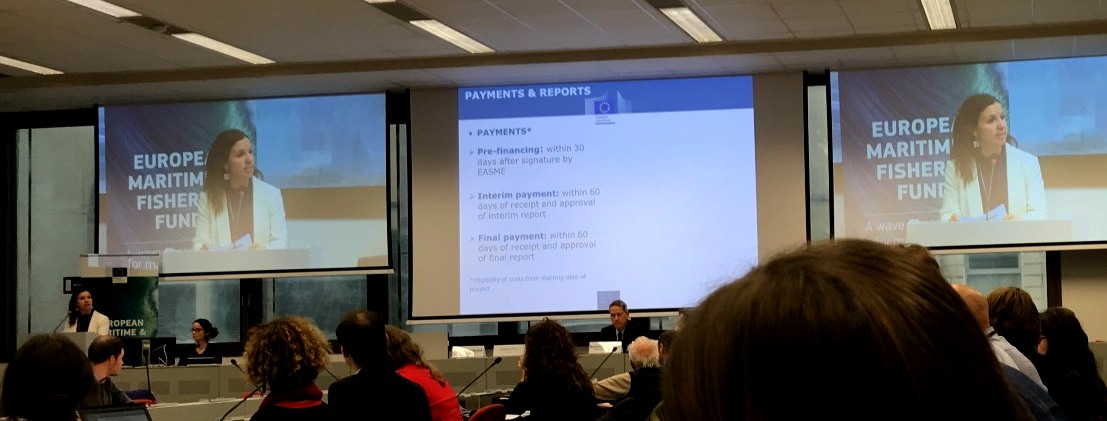
HOW
TO APPLY FOR FUNDING: Victoria Beaz Hidalgo (seen in the picture
above) spoke about some of the pitfalls
that applicants fall foul of when applying for EU resarhc
grants - and how
to tick the right boxes.
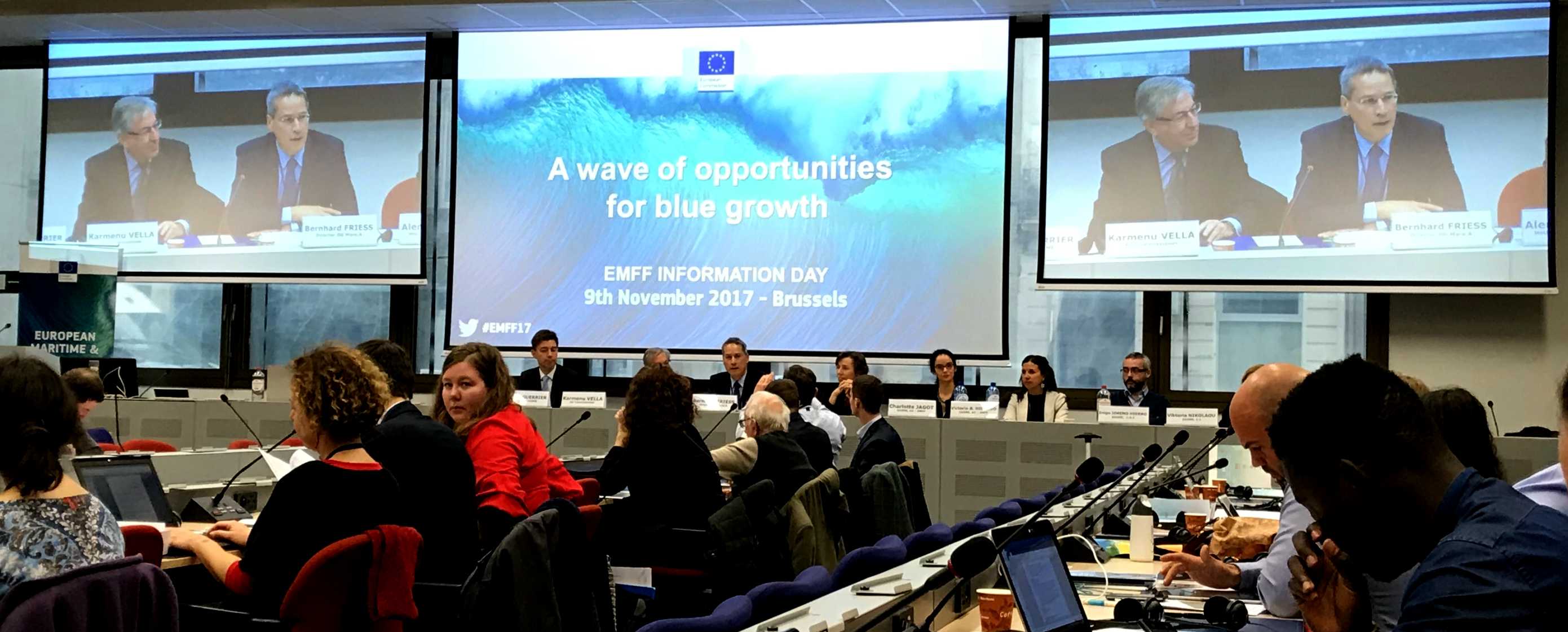
QUESTIONS
ANSWERED: Bernhard Friess chaired the question and answer
section before the lunch break. Bernhard is the Director of
Maritime Policy and the Blue
Economy DG MARE. Another question posed by our
man in Brussels was to do with down scoring as a result of a
lack of trading track record. This question remains
unanswered, we presume because it is awkward and may put off a
number of potential applicants, where for the EU it is the
numbers game and some kind of a scatter-gun approach. We do
though live in hope that they score with this approach.
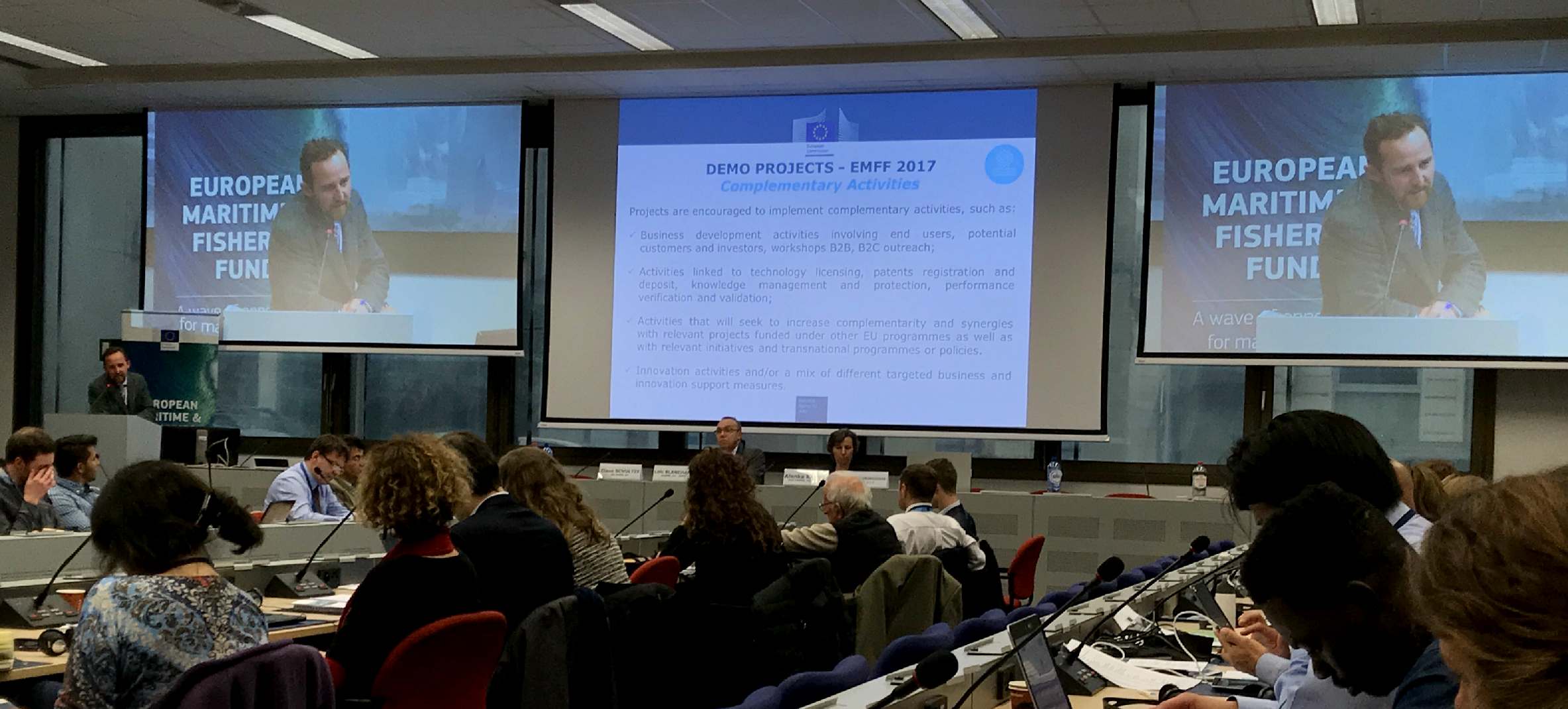
MARINE
LITTER: One of the most enthusiastic afternoon speakers at
this conference on the 9th of November in Brussels, was Claus Schultze from the DG MARE maritime
innovation and marine knowledge & investment section of
the European Union. He explained to the audience, a packed
house of some 247 delegates that, this call was a pilot action
and that it was up to the stakeholders represented by those in
the audience, to provide some feedback. Claus acknowledged
that desperately needed innovation "can only happen if we
invest." The EU was taking this action in the hope of
bridging the "financing gap," what he described as
the "valley of death." The focus was on drivers and innovation.
We could not agree with the speaker more.
In a rapid follow up to the EU-hosted 2017 Our Ocean conference, and in the run-up to the COP23 Ocean Day in Bonn (11 November), the European Commission
launched a new EUR 14.5 million investment initiative to further promote sustainable blue growth across the EU.
Commissioner for Environment, Maritime Affairs and Fisheries Karmenu Vella said: "At the Our Ocean conference in Malta, the European Union led by putting the blue economy on the agenda for the first time. Now we are leading in the follow up. Today we launch a EUR 14.5 million investment initiative for green projects to safeguard our marine ecosystems. On ocean energy, tackling
marine
litter, and along Mediterranean coastlines, I am delighted that we are so quickly following up on our Our Ocean pledges."
Funded under the European Maritime and Fisheries Fund, EUR 8 million from this initiative are set aside to help SMEs, including start-ups, testing novel products and services in high-potential emerging
blue economy sectors, including ocean
renewable energy. In order to better tackle the growing challenge of marine litter, a further EUR 2 million will target innovative technologies to prevent, monitor, remove and recycle marine litter from EU waters. Furthermore, EUR 3 million will support twinning projects in the
Mediterranean
Sea, including between maritime training and education institutions, blue economy businesses and local fishing communities. Finally, EUR 1.5 million is allocated to restoring marine and coastal ecosystems in the
Mediterranean, including mitigation of
climate change.
The Our Ocean conference (5-6 October in Malta) generated an unprecedented level of commitments : 437 were announced, including
EUR 7.2 billion in financial pledges. The EU alone announced 36 commitments amounted to over EUR 550 million. Moreover, the EUhosted conference saw for the first time large-scale mobilisation of the private sector in ocean conservation.
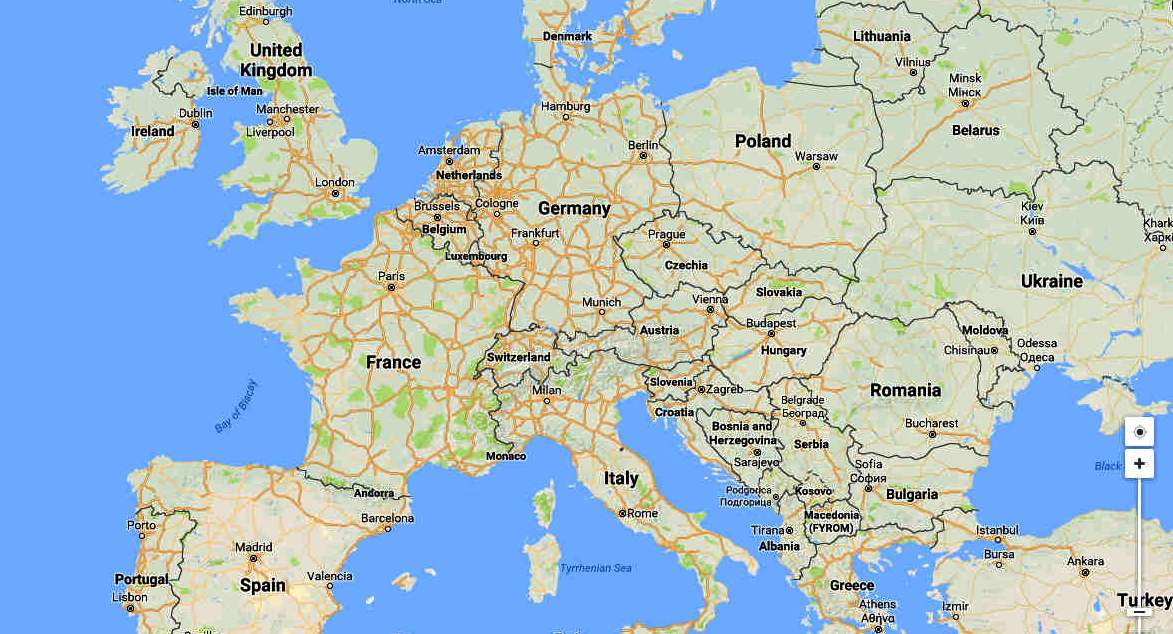
BELGIUM -
The Kingdom of Belgium, is a sovereign state in Western Europe bordered by France, the Netherlands, Germany, Luxembourg, and the North Sea. It is a small, densely populated country which covers an area of 30,528 square kilometres (11,787 sq mi) and has a population of about 11 million people. Straddling the cultural boundary between Germanic and Latin Europe, Belgium is home to two main linguistic groups: the Dutch-speaking, mostly Flemish community, which constitutes about 59 percent of the population, and the French-speaking, mostly Walloon population, which comprises about 40 percent of all Belgians. Additionally, there is a small ~1 percent group of German speakers who live in the East Cantons.
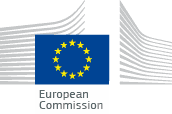
CONTACTS
European
Maritime & Fisheries Fund
Covent
Garden Building
Place
Charles Rogier, 16
B-1210
Brussels
LINKS
& REFERENCE
https://ec.europa.eu/maritimeaffairs/events_en
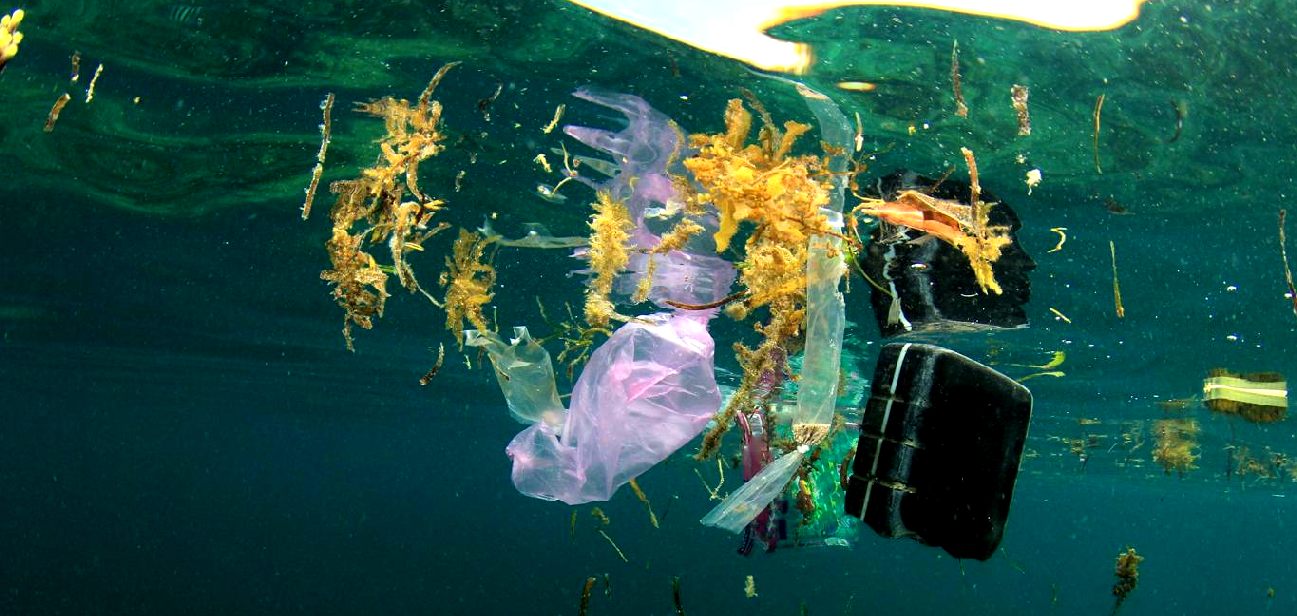
SUSTAINABILITY:
When you consider the size of the Mediterranean Sea, 14 million
euros may not seem like much to be able to tackle the problem
of marine litter and this has been the view of the assessors,
or rather applications in respect of Horizon 2020 calls have
not been funded because of budgetary constraints, though
considered to have merit. What is likely to happen as a result
of budget shortfalls is that project proposals will need to be
curtailed such as to qualify - to at least keep the technology
ball rolling. Alternatively, entrepreneurs and research
establishments may take the view that such endeavors aught be
put on the back burner until such time as marine litter
becomes recognised for the blocker in sustainability terms
that it is.
This
website is provided on a free basis as a public information
service. copyright © Cleaner
Oceans Foundation Ltd (COFL) (Company No: 4674774)
November 2017. Solar
Studios, BN271RF, United Kingdom.
COFL
is a charity without share capital. The names AmphiMax,
RiverVax
and SeaVax
are trade names used under license by COF in connection with their 'Feed
The World' ocean cleaning sustainability campaign.
|


